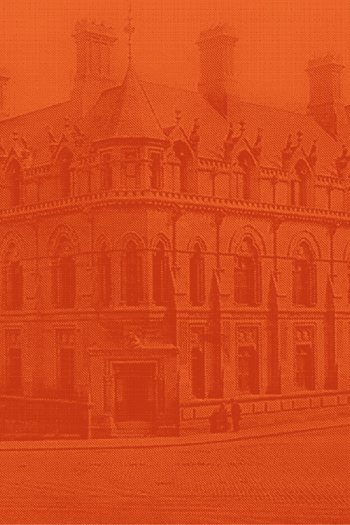You’ll learn:
- About the importance of the Watson Plans Collection and what they represent
- How the entire collection at The Common Room is being digitised to make it more accessible
- About plans to achieve Archives Accreditation and to make the book collection available on the National Bibliographic Knowledge Base
The Common Room is a place like no other. Steeped in history, our library is one of the most important in the world for the study of the industrial revolution.
With tens of thousands of books, documents and plans, our archive has been a bastion of engineering knowledge for over 150 years.
But the real jewel in our crown is the Watson Plans Collection, a resource of international importance to the understanding of early railways and the industrial revolution’s development.
And, because of The Common Room, this collection will now be available online for the first time to researchers across the globe.
The Importance of the Watson Plans
Comprising 686 plans, the Watson Plans Collection has been restored and made accessible to all as part of the ambitious project to put our library fully online.
Some 23 plans which were deemed the most damaged were conserved by local specialist Victoria Stevens with a grant from the National Manuscripts Conservation Trust (NMCT) and the National Lottery Heritage Fund.
These plans and the remainder of the collection were then digitised at Northumberland Archives so they can be accessed at the touch of a button anywhere in the world.
An Invaluable Resource
The collection as a whole dates from 1728 to 1905, with the majority being in the 1750-1830 range. The plans detail the day-to-day functioning of the coalfield and this remains invaluable to researchers today.
The majority of the plans show the Great Northern Coalfield which was at the time the biggest in the world, producing 30-40% of British coal.
The demand for coal led engineers to look for new technologies to make the process more efficient and these innovations are documented through the plans.
The Watson Plans enabled the plotting of the early waggonways against modern mapping to show the world’s first network of early railways. It really shows that development beautifully.
The maps are also useful for people who are looking at the history of the North East. The Ordnance Survey Maps only start in 1850 so these plans provide much earlier information.
During the renovation work at Neville Hall, we found a solid brass plaque dating back to 1868 which marked the date on which John Watson Esq bequeathed these plans and papers to the Mining Institute. It’s a great reminder of how this important collection has been cherished for many years. The Common Room will give them the wider recognition they deserve.
Bringing the Collection to a Global Audience
While we have the Watson Plans and the rest of our fantastic collection, we have found in the past that a lot of people just didn’t know we were here or how to access our library.
That is why in 2016 we began the ambitious project of digitising our entire collection. This involved a team of dedicated volunteers scanning millions of original documents, photographs and negatives, transcribing handwritten documents and creating tags so the information can be accessed through online search. This is an ongoing project of enormous scale which will preserve and promote our region’s rich industrial heritage.
Ultimately, digitisation will help us to become known. We want the world to be aware of us and know that we’re open for them to come and use the collections. Being online means we can offer the same service to someone in Newcastle, UK, as easily as someone in Newcastle, Australia. The Common Room and the digitisation of our collections will give us global reach.
Looking to the future
To now be able to introduce our library to so many people through The Common Room is just wonderful.
To get to the point where people both in the region and worldwide know we exist as a resource they can use and enjoy is amazing.
In my opinion, there is no point in keeping things if you’re not going to show them to people. The point of archives is not to just store a load of documents. The point of archives is to preserve and to provide access. That’s always been very much our focus.
The Common Room is a warm, comfortable and accessible space and of course a much better home for the collections. My goal is to get Archives Accreditation, which is the UK gold standard for archive services.
This is something we couldn’t have done before because our strong room wasn’t good enough, whereas our new archives room has all of the necessary fire-suppression and monitoring tools. It is lovely to get to this point and know that the collections are now properly stored and protected for the future.
We also hope to get our book collection onto the National Bibliographic Knowledge Base, which is where all the university and special collec- tions library catalogues come together so that academics can search for information.
Free Access for all
Importantly, using The Common Room’s library is free. As a librarian, it always felt wrong to charge people for access to information but we needed to do this in the past to stay open.
To now be able to offer records without any fees because of the funding we received and to provide a level of service not dependent on who can afford to pay for it is very rewarding.
For me, being a librarian at The Common Room isn’t just about books, it’s about people. It’s about those moments when you bring people together with the information they need to answer their questions – sharing knowledge and making our resources accessible to all.
Bio
Jennifer Hillyard has worked at The Mining Institute since qualifying as a librarian in 2006. She has a background in English Literature and Language with a specialism in children’s fiction so working with this collection has been a steep learning curve. She was a Carnegie-Greenaway Medal judge for 2017/18 and is the chair of Youth Libraries Group North East as well as a committee member for CILIP North East. Jennifer also works part time for the National Acquisitions Group as its Business Development Manager.


